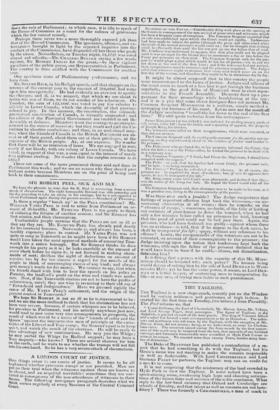A LONDON COURT OF JUSTICE.
Onto things occur in our courts of justice. It seems to be all haphazard whether prisoners escape or are punished. Men are Put on their trial when the witnesses against them are known to be absent, and an acquittal inevitable : sometimes they are con- victed in consequence of the non-attendance of witnesses in their favour. The following newspaper paragraph describes what we think occurs regularly at every Sessions of the Central Criminal Court.
It might be almost supposed that in this country the people were unaccustomed to the forms of justice. Judges and officers of the court seem as much at a loss how to get through the business regularly, as the good folks of Montreuil were to elect repre- sentatives to the French Assembly. DusioNT drew up a pro- gramme for their proceedings while breakfasting at the inn ; and it is a pity that some clever foreigner does not instruct Mr. Common Sergeant MinErtousx in a uniform, simple method o arranging the business of his court. Let us now see the result off the Judges' resolution "to call the list down to the end of the first hour." We still quote verbatim from the newspapers—
James King junior (at ten o'clock), was indicted for stealing twenty yards of silk velvet, value 12/., from his father, and a quantity of apparel, the property of Joseph King, his brother. The witnesses %%ere called on their reeognizances; which were cstreated, as they did not answer.
The Common Sergeant said, hc could portly account fw the parties not np. pealing, as their wilco innately stood in the relation of father and brother to the prisoner.
The Policeman who pushiestl the stolen property informed the Court, that when the fade r was at the Police-office, he wished the prisoner to be dealt with in a summary way.
The C iiiii mon Sergeant--" I think, had I been the Magistrate, I should have complied with the request." The Police an said, that Me brother had sworn falsely, the prisoner sail; and he insis I or being committed.
The Conta—" Mime' be wdeuhr:ed on his chances. At all events, the prisoner me • he acquitted for want of evidence; but, if ever he appears here again, he nil be transported life." Alr. King senior came into Court soon afterwards, and declared that Macs., was the cause of his being too late. He hoped the Court would take off the estreat.
The Common Sergeant said, that allowance was to be mule in his case, as it was a peculiar one, owing to the consanguinity qf the parties.
Was there ever such a jumble ? Time Judge conjectures that feelings of repentant affection kept back the witnesses,—an un- necessary observation at all events: then he remarks on the " chances of escape,"—conscious, no doubt, of the folly of holding out certainty of punishment to deter the tempted, when he had only a few minutes before called up prisoners for trial, knowing that the proof of guilt could not be had just then. Again, the prisouer, who had been declared not guilty—against whom there was no evidence—is told, that if he appear in the duck again, he shall be trantported for life ; gnu, without any reference to his offence? Lastly, the recoguizances of the witnesses are not to be estreated, on account of their consanguinity to the prisoner; the Judge insisting upon the notion that tenderness kept back the witnesses, altheugh the father of the prisoner declared that he would have been in time if he could,—illness, not disinclination, detaining Ii un!
Is it fitting that a person with the capacity of this Mr. MIRE- HOUSE should be invested with such power? No human being would dream of setting him by the side of Lord DENMAN iii West- minster Hall ; yet he has the same power, it seems, as Lord DEN- MAN or a better lawyer, of sentencing men to transportation for life—at any rate, of trying men liable to such punishment. lil-,INESS OF THE COU RT. —Considerable delay took place at the opening ot the teinrt, in consequence of the non-arrival of prosecutors and witnesses, which has been a frequent cause of complaint. The Common Sergeant regretted that uo rule was established upon which the Court could act rigidly. Endeavours had been made to inform the public (through the press and otherwise) when the trials of the several prisoners would come on ; but he thought that nothing could be effectually done until the list was put up one day before that of trial. Alr. Clarkson was understood to suggest, that that plan could not be adopted mail it was arranged for the Grand Joey to commence a day or two before the Court put prisoners on their trial. The Common Sergeant said, for the pre- sent he would adopt a plan which would les fair for all parties—viz, to call the list down at the end of the first lair; and if the witnesses hail not arrived, their recognizanees must be estreated, and the prisoners acquitted. The Judges ruled that witnesses ought to presume that every trial would come on on the first day of the session, and therefore they ought to be in attendance day by day.


























 Previous page
Previous page